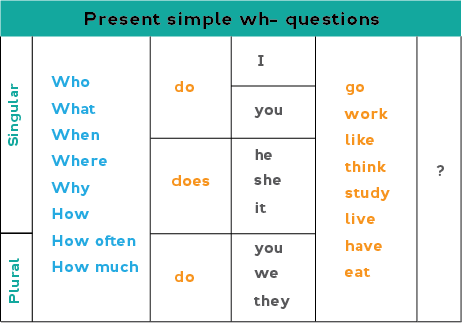SIMPLE PRESENT:
FORMING THE PRESENT SIMPLE:
SIMPLE PRESENT - GRAMMAR
The simple present tense in English is used to describe an action that is regular, true or normal.
We use the present tense:
1. For repeated or regular actions in the present time period.
- I take the train to the office.
- The train to Berlin leaves every hour.
- John sleeps eight hours every night during the week.
2. For facts.
- The President of The USA lives in The White House.
- A dog has four legs.
- We come from Switzerland.
3. For habits.
- I get up early every day.
- Carol brushes her teeth twice a day.
- They travel to their country house every weekend.
4. For things that are always / generally true.
- It rains a lot in winter.
- The Queen of England lives in Buckingham Palace.
- They speak English at work.
Verb Conjugation & Spelling
We form the present tense using the base form of the infinitive (without the TO).
In general, in the third person we add 'S' in the third person.
Subject | Verb | The Rest of the sentence |
I / you / we / they | speak / learn | English at home |
he / she / it | speaks / learns | English at home |
The spelling for the verb in the third person differs depending on the ending of that verb:
1. For verbs that end in -O, -CH, -SH, -SS, -X, or -Z we add -ES in the third person.
- go – goes
- catch – catches
- wash – washes
- kiss – kisses
- fix – fixes
- buzz – buzzes
2. For verbs that end in a consonant + Y, we remove the Y and add -IES.
- marry – marries
- study – studies
- carry – carries
- worry – worries
NOTE: For verbs that end in a vowel + Y, we just add -S.
- play – plays
- enjoy – enjoys
- say – says
NEGATIVE FORM:
Examples:
- I don't play tennis often. / I do not play tennis often.
- My mother doesn't enjoy rap music. / My mother does not enjoy rap music.
- We don't sleep late on weekdays. / We do not sleep late on weekdays.
- The teacher doesn't read comic books. / The teacher does not read comic books.
- My professor doesn't believe my excuse. / My professor does not believe my excuse.
YES/NO QUESTIONS
Examples:
- Do you work at the library?
- Does she think it's good?
- Does he live in China?
- Do you eat meat?
- Do they have children?
WH - QUESTIONS:
Examples:
- When do you study English?
- How often does he eat pizza?
- Where does your mother live?
- Why do you think that?
- Who do they like?
- What does the girl have in her bag?
- How much does your dog eat?
A - AN

1. Where do you live?
2. What time do you get up on weekdays?
3. What do you eat for breakfast?
4. Where do you go after class?
5. What kind of music do you like?
6. What do you do on the weekend?
7. What time do you go to bed?
8. What TV shows do you watch?
9. What do you and your friends do on Saturdays?
10. Where do you and your classmates have lunch?








No hay comentarios:
Publicar un comentario